The benefits of persimmon for the human body. Why is persimmon useful for the body
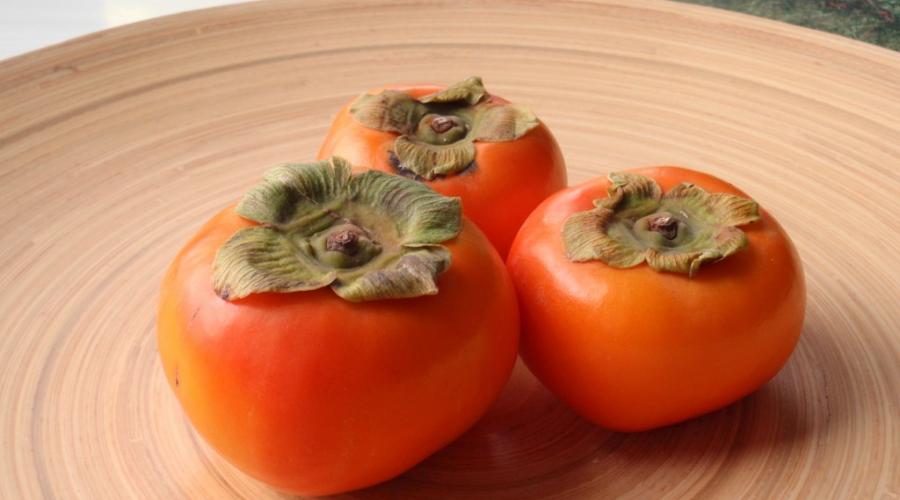
Health 11/23/2013
Irina23.11.2013 The benefits and harms of persimmon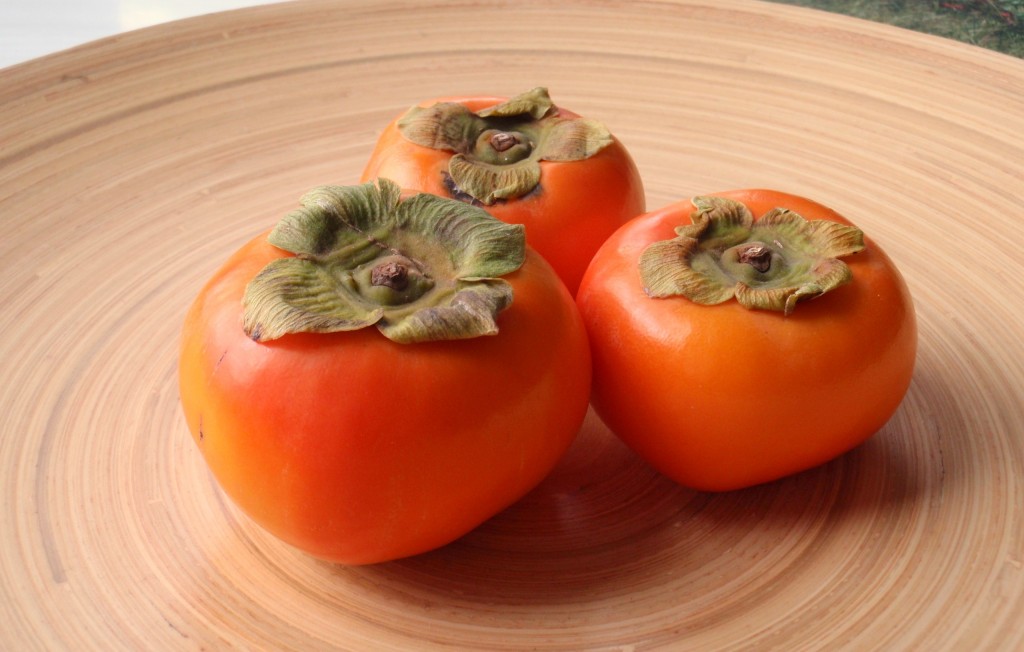
Dear readers, autumn and winter are good in their own way, probably. There are fruits and berries that you simply cannot find in summer. One of these berries is persimmon. I propose to talk today about useful properties ah persimmons. I hope you do not pass by persimmon, buy it for yourself and your loved ones? I love persimmon. Especially in November, when the fruits are fully ripe, and it tastes less tart. Although again, it all depends on the type of persimmon. Let's try to figure out all the intricacies today.
Now so often you hear conversations about how to cook something tasty, unusual, exotic. Moreover, we often ignore the usefulness of such dishes. The main thing is to eat deliciously. A familiar situation, right? But there are no problems with persimmon. This is just a healing meal on our table.
Persimmon is the name of a deciduous tree that reaches 15 m in height. There are over 2 thousand varieties of persimmon in the world. In Russia, there are two varieties of persimmon: common and king. The Greeks call persimmon the food of the Gods or Divine fire. Persimmons also have other names: Chinese peach, heart berry. It grows all over the world. Ripe persimmon fruits are bright and juicy, have a bright rich color, sweet in taste. But unripe persimmon is simply impossible to eat, it knits so much.

Persimmon. Beneficial features
The benefits of persimmon for our heart and blood vessels, to strengthen the immune system.
- It contains a large amount of vitamins A and C.
- Persimmon is also rich in trace elements. Contains potassium, calcium, iodine, manganese, iron. Perfectly replenishes iodine deficiency in the body.
- Persimmon contains a large amount of magnesium, it is simply a champion in its content, which is very good for our blood vessels and heart function.
- In the fight against atherosclerosis, persimmon is ahead of even apples.
- Tones up the body, increases efficiency.
- Doctors recommend eating persimmons for those who suffer from varicose veins, as well as bleeding gums.
- Strengthens the immune system.
- Contains antioxidants that protect our cells from aging and cancer.
- Promotes growth retardation of age-related neoplasms.
- Persimmon contains tannins, which have an antitumor effect.
- Eating 2-3 persimmons daily, you can forget about pain in the heart for a long time.
- For colds, it is recommended to gargle with juice diluted with warm water.

The benefits of persimmon for digestion.
- Ripe persimmons help to improve the functioning of the entire gastrointestinal tract and liver.
- Persimmon has a bactericidal effect against Escherichia coli, Staphylococcus aureus.
- The presence of pectin in persimmons can treat intestinal disorders. Only in this case, one must be wise in the amount of persimmon consumed per day. There will be information about this a little below.
With diarrhea, a decoction of persimmon fruits will help. Take a glass every 4 hours.
The benefits of persimmon for vision.
Thanks to beta-carotene, persimmons are very useful for maintaining vision.
The benefits of persimmon for the kidneys.
Magnesium, which is rich in persimmons, reduces the likelihood of kidney stones and helps to remove various salts from the body, thereby relieving the work of the kidneys. Persimmon has a diuretic effect. Moreover, this is a natural diuretic, which, unlike pharmaceutical preparations, does not wash out potassium.
The benefits of persimmon for anemia.
Thanks to the iron contained in persimmons, it is recommended for the treatment of anemia. To do this, take 50-100 grams of persimmon juice a day 2 times before meals. It is useful and simple to drink tea from persimmon leaves.
The benefits of persimmon in dietetics.
It perfectly satisfies hunger, therefore it is included in many diets for weight correction.

Persimmon during pregnancy.
Pregnant women always want something like that ... Exotic, for example. Therefore, persimmon can help a lot here. 2-3 persimmons a day will be very useful for future mother... It is only important not to overdo it. You can learn about how it is useful for expectant mothers from the useful properties of persimmons, which are described above. Contraindications: diabetes mellitus and possible allergic reactions. If you notice a rash, swelling, tearing, be sure to see your doctor.
The benefits of persimmon in cosmetology.
It is very good to use persimmon masks for enlarged pores and problem skin. Mix persimmon pulp with egg yolk and apply on face for 10 minutes. Wash off with warm water. It is advisable to carry out the procedures in a course every other day for two weeks.
Persimmon. Calorie content.
Despite the fact that persimmons are sweet in taste, their calorie content is low - about 53 kcal per 100 grams.
Persimmon. Contraindications
Persimmons should be eaten with caution for people with severe forms of diabetes mellitus and people after stomach surgery.

How to choose a persimmon?
It should be free of stains, no damage, smooth. Pay attention to the color of the persimmon itself and its petals. They should be brown, brown, not green. This indicates the ripeness of the persimmon. It is better to keep the petals dry. You can also determine its ripeness by touch. If it is dense, then it will definitely knit, it is impossible to eat such a persimmon. And pay attention to the color of the berry itself: the brighter is the more ripe persimmon. Of course, the most delicious persimmon with such a semi-liquid, jelly-like content. The softer the side, the tastier and more ripe the persimmon. You need to carry it home very carefully. Eat immediately, do not store it.
In the second half of autumn, the fruits of persimmon appear on sale, endowed with healing properties... These bright orange berries have a tart, sweet-astringent taste; they are actively used in folk medicine and cosmetology, in cooking and as a delicacy.
Compound. Content of vitamins, micro and macronutrients
The chemical composition of persimmon is characterized by the presence
vitamins:
- B1 - 0.02 mg;
- PP (niacin equivalent) - 0.3 mg;
- Beta-carotene - 1.2 mg;
- B2 - 0.03 mg;
- PP - 0.2 mg;
- E (TE) - 0.5 mg;
- A (RE) - 200 μg;
- C - 15 mg;
macronutrients:
- sodium - 15 mg;
- calcium - 127 mg;
- phosphorus - 42 mg;
- magnesium - 56 mg;
- potassium - 200 mg;
trace elements- they are presented in the fruit with iron (2.5 mg).
Calorie content. How many calories are in 100 gr. product
The nutritional value of persimmons is due to the contained:
- Proteins - 0.5 g - 1.1% of the daily requirement;
- Carbohydrates - 15.3 g - 6.2%;
- Dietary fiber - 1.6 g - 8%;
- Fat - 0.4 g - 0.7%;
- 0.1 g each of saturated and unsaturated fatty acids, organic acids;
- 15.3 grams of di- and monosaccharides.
For 100 grams of fresh persimmon, there are 0.6 grams of ash and 81.5 grams of water, and the calorie content of the product is 67 kcal.
Benefits and beneficial properties of persimmons for human health
Persimmon is a berry with a high potassium content, so its regular use helps to restore sodium-potassium balance. Magnesium - will help to cope with depression and improve mood, and beta-carotene - will strengthen the organs of vision and improve the condition of the eyes in various diseases.
The medicinal properties of persimmons are valuable in cosmetologists - masks from berries are used to get rid of acne, narrow pores and give the skin a blooming appearance:
- 1 fruit and 1 raw fresh yolk chicken eggs grind into a homogeneous mass;
- the ready-made mixture is applied to the face and décolleté for 23-25 minutes;
- after the mask is washed off with running warm water.
The antioxidants that are the constituents of persimmons prevent early aging, have a general anti-aging effect and tighten the skin. Berries are a prophylactic anticancer agent and an assistant in the fight against malignant tumors.
Berries have a beneficial effect on the digestive tract:
- relieve disorders;
- help fight infections;
- improve the functioning of all digestive organs and help cleanse accumulated toxins, carcinogens, toxins and other harmful substances.
Benefits for men
Especially the prices of persimmon fruits for the male part of the population, since they help to improve potency and normalize the function of the prostate gland:
- provitamin A is involved in spermatogenesis and the synthesis of sex hormones, stops the development of pathologies on the mucous membranes;
- vitamin B group helps to lower the amount of the hormone prolactin, due to which prostate adenoma develops;
- vitamin C prevents impotence from developing and improves the quality of the sperm produced.
The normalized use of fruits is the same:
- will increase efficiency;
- prevent the development of vascular and heart diseases;
- help to cope with high blood pressure;
- relieve infectious diseases.
Benefits for women
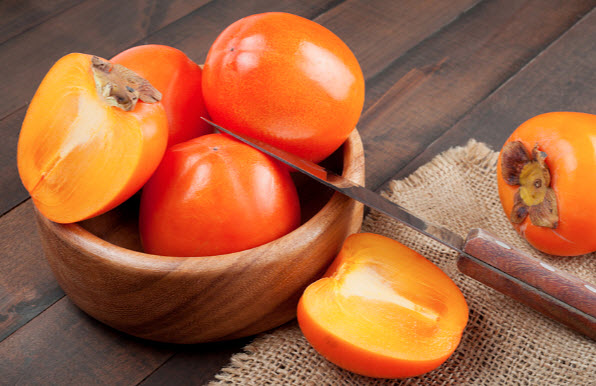
Berries have a very beneficial effect on the female body:
- relieve symptoms of menopause and reduce pain during menstruation;
- reduce the risk of heart disease;
- normalize acid-base balance;
- useful in the treatment of female diseases, even infertility;
- strengthen nervous system and normalize metabolic processes.
Persimmon is good for hair - berries crushed with a blender are applied to the hair before washing, leaving for 20-30 minutes. The mask will make your hair uniquely soft and moisturized, strengthened and brightened.
Benefits for children
Ripe fruits are indicated for consumption by children. Berries:
- are the prevention of acute respiratory infections and acute respiratory viral infections, since they contain a lot of vitamin C;
- improve the body's resistance to harmful bacteria and improve vision, for which beta-carotene is responsible;
- calcium contributes to the normal growth and strengthening of the nail plates, bone tissue, hair;
- make it possible to avoid anemia and thyroid diseases, improve clotting and prevent the development of hemophilia, thanks to the containing gland.
Persimmons are allowed to be included in the diet of children who have reached one and a half years of age, while - you should not abuse its amount, so as not to cause constipation.
Weight loss benefits (diet)
The use of persimmons during the diet is not prohibited if there are no direct contraindications. This berry perfectly satisfies hunger, cleanses the intestines and contains relatively few calories.
On persimmon are carried out as fasting days- during the day they eat only fruits and drink water, or green tea and full-fledged diets, on which you can lose up to 4 kilograms per week.
The dietary menu is made in such a way that persimmon is the main ingredient, while - once every seven days, they arrange a fasting day on fruits alone. Additional foods in the diet are:
- boiled chicken breast - up to 200 grams per day;
- cottage cheese - no more than 250 grams;
- low fat yogurt - up to 0.5 l;
- vegetable stew - up to 500 gr.
It is important to observe the drinking regime - drink from 2 liters of liquid, as well as the duration of the diet, which should be followed up to 2 weeks. A persimmon diet has a beneficial effect on the figure and on the general condition of the body, since the berries contain a considerable amount of nutrients and vitamins.
The benefits and harms of persimmons during pregnancy
While carrying a child, taking many medications is contraindicated, so you should pay attention to persimmon, which is considered an excellent natural immunostimulant - vitamin C in its composition will help to cope with infectious and viral diseases, it is also the best prevention of their manifestation.
Regular consumption of berries will help the expectant mother prevent the appearance of stretch marks on her chest, hips and rapidly growing tummy. This property is due to the presence of beta-carotene in the biological composition.
The magnesium found in persimmons is not only important for the full development of the fetus and maintaining the health of the pregnant woman herself, it is also:
- relieves uterine tone;
- reduces leg cramps;
- reduces the likelihood of kidney stones;
- removes puffiness, as it has an excellent diuretic effect.
Regular eating of ripe fruits will prevent the development of anemia and will not allow you to gain excessive weight, improve metabolic processes in the body and satisfy the nutritional needs of a pregnant woman.
When breastfeeding, persimmon is not a prohibited product, but it should be eaten very carefully.
Persimmon will help improve immunity, improve digestion, and get a full range of nutrients. It is important to eat only ripe fruits, without the slightest sign damage. With gv, it is worth giving preference to sweet, less astringent persimmon varieties (for example, "kinglet").
During lactation or pregnancy, the main contraindications for taking berries are:
- personal intolerance to the product;
- persimmon allergy;
- digestive problems;
- certain chronic diseases - in this case, before using the fruit, you need to consult a doctor.

Persimmon has a positive effect on most organs, helps to normalize their work and relieve unpleasant painful symptoms. She will help:
- For diarrhea - the product has an astringent and anti-inflammatory effect. To get rid of diarrhea, it is recommended to eat half a berry on an empty stomach.
- In gynecology, the product the greatest benefit will bring pregnant women, as it helps to reduce the tone of the uterus.
- Persimmon - will help to cope with heartburn. Having eaten just one berry, you can get rid of this trouble for the whole day.
- For hypertension, a daily intake of the product is recommended. The rationed amount of the product will help get rid of high blood pressure and keep it within the normal range.
- For constipation, the use of persimmons is indicated, since the berry is rich in dietary fiber and fiber, which stimulate the activity of the intestines. To get rid of constipation, it is enough to eat 2-3 fruits every morning on an empty stomach, then the problem will be solved in a gentle and safe way.
You can get rid of acne by applying persimmon internally and externally:
- a couple of berries every day will provide the body with the most useful minerals and vitamins, antioxidants and other substances;
- dietary fiber and fiber will cleanse the intestines and help the digestive tract (it's no secret that acne often occurs due to internal "problems");
- a mask made from the product has a beneficial effect on the skin, cleansing it and improving its appearance.
An anti-inflammatory skin mask is prepared as follows:
- half of the grated fruit is mixed with a teaspoon of citric acid;
- the mixture is applied to the skin;
- wash off the mask after 15 minutes with running water;
- the procedure is carried out three times a week.
For the liver
If you have liver disease, you should get medical advice before including persimmons in the menu. If there are no contraindications, then taking the product will bring great benefits to the body:
- help to recover;
- protects against obesity;
- prevent cirrhosis;
- will remove accumulated toxins and other harmful substances.
For the intestines
The chemical composition of the product determines its unconditional benefit for the intestines:
- eliminates diarrhea and constipation;
- stimulates the activity of the organ;
- helps to regulate the processes occurring in the digestive tract.
- 6-7 ripe cut fruits are poured with 750 ml of boiling water;
- the mixture is infused for half an hour;
- the strained broth is drunk in a glass every 2–2.5 hours.
In case of acute intestinal obstruction, you should refrain from taking persimmons.
For the stomach
Persimmon has a good effect on the stomach, improving its functioning and relieving pain symptoms. The high content of pectins provides not only the normalization of the gastrointestinal tract, but also provides an antibacterial effect, helps to get rid of harmful microorganisms.
For heart
The diuretic effect of the product is conducive to the removal of puffiness and a decrease in cardiac load. Persimmons are also recommended to eat with varicose veins and atherosclerosis.
Benefits and harms in diseases
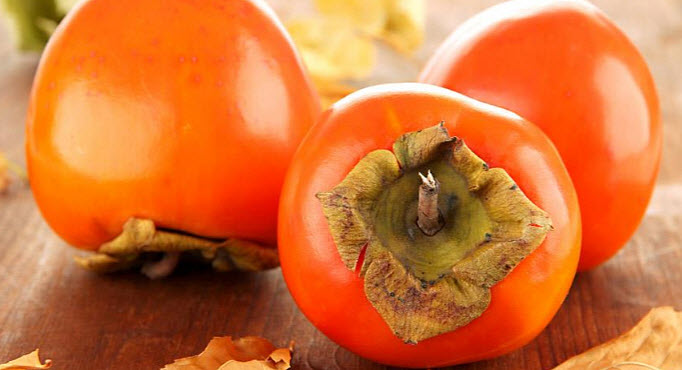
Persimmons are not only tasty and rich in vitamins, but also help in the treatment of many diseases. What is the use of persimmons?
With multiple sclerosis especially important is the correct balanced diet which includes the most healthy foods, including persimmon. The high content of B vitamins helps to maintain a stable condition in patients with this incurable disease, and also - is its prevention.
With oncology patients are shown the use of persimmon. This berry will provide the body with the necessary substances, help to avoid deterioration of the condition and improve the immune defense. Eating several fruits of a bright berry daily throughout its ripening will help from the development of cancer.
With the thyroid gland persimmon restores iodine levels, improves well-being and relieves symptoms of the disease.
With kidney disease persimmon should be included in the diet, it has a diuretic effect, prevents the formation of stones in the organ and removes sand from the kidneys.
With type 2 diabetes
The glycemic index of the product is 70 units, so its use in diabetes is allowed only after consulting a doctor.
With type 1 endocrine disease, the product is allowed in small quantities for those patients who have been diagnosed with sharp surges in blood sugar - a relative insulin deficiency. Others should refrain from taking berries.
With type 2 diabetes, it is allowed to eat 1-2 fruits a day in several doses. It is important to monitor blood sugar - if its level has risen sharply after eating persimmons, then it is advisable to refuse the berries.
With pancreatitis
With this disease, persimmon is not a strictly prohibited product, but it can be eaten only under certain conditions:
- in the acute phase of pancreatitis, it is worth abandoning the berries, otherwise the condition may worsen;
- during remission, it is allowed to eat 1 piece of persimmon a day, so as not to provoke an exacerbation of the disease.
With gastritis
This disease is not a contraindication to eating persimmons, however, it should be eaten carefully and in limited quantities. The fruits must be ripe and minimally astringent.
The product can be eaten even by people with high acidity, as it will not harm the stomach. Refrain from eating persimmons should only be in case of ulcers and acute erosive gastritis.
Harm and contraindication of persimmon for humans
In spite of great amount of the most useful properties and amazing taste, persimmon also has certain contraindications. You should not include a product in the menu when:
- individual intolerance;
- acute pancreatitis;
- obesity tendency;
- gastric ulcer;
- allergies;
- intestinal obstruction.
Answers to popular questions
![]()
Persimmon often raises questions regarding its proper use, selection and storage. You can find answers to the main ones below.
What is the best way to eat this product?
The main way of using persimmon is to eat it fresh, so the most useful properties of the product will not be lost. In addition, persimmon:
- added to fruit salads and compotes;
- used as a base for sauces;
- used to decorate dishes.
Fresh persimmons make incredibly tasty cheesecakes and jellies, and dried persimmons are often eaten instead of sweets - they taste like other sweets.
Only ripe persimmons should be eaten, it is in it that the maximum benefit lies. If unripe fruits are purchased, you can accelerate their ripening by simply putting them in the freezer for 13-15 hours. The beneficial properties of persimmon after freezing are in no way inferior to those found in fresh fruits.
Norms for the use of persimmons in food (Daily norm)
In the absence of obvious contraindications to the product, you can eat persimmons almost unlimitedly, but the average daily norm for an adult healthy person an amount not exceeding 3 fruits is considered.
How much a child can eat a day of persimmon after 1.5 years - the mother must decide after consulting a pediatrician. as a rule, it is recommended to give no more than 1 fetus per day, focusing on the condition of the baby.
Let's sum up the benefits of persimmon
Bright, juicy persimmon with a tart taste is a storehouse of useful substances and vitamins. It helps to eliminate imbalances in the digestive tract, gives beauty and restores potency, improves vision and provides the body with the necessary biological substances... Normalized use of the product in the absence of contraindications will bring maximum benefit and fully satisfy even the most demanding taste.
News that helps!All about persimmon about its benefits and harms to humans. Persimmons are the fruits of trees or shrubs that belong to a family called ebony.
These berries are quite large in size and have a deliciously sweet and juicy taste. The mass of fruits, depending on the variety (more than 500 varieties are distinguished), is 100 - 500 grams. The skin color ranges from orange to bright red.
Persimmon grows mainly in countries with a warm climate. For example, this plant bears excellent fruit in the North and South America, Australia, Eurasia.
Nutritionists strongly advise for diseases of the cardiovascular system to include persimmons in the diet, which has a much more beneficial effect than apples. Persimmon also does an excellent job of preventing these diseases.
Numerous clinical studies have proven that this fruit contains a huge amount of polyphenols and vitamins, as well as dietary fiber and minerals. Persimmons are an excellent source of tannins, which are powerful antioxidants. All data chemical substances in persimmon they actively fight against the occurrence of atherosclerosis in the body, which leads to heart attacks and strokes. Therefore, it is recommended to eat one fruit per day during the ripening period of persimmons, which will prevent atherosclerosis.
It is worthwhile to study in more detail the topic "persimmon benefits and harms to the health of the human body" in order to have a complete picture of this fruit.
Persimmon benefits and harms of calories
Persimmon fruit weighs on average about 170 grams and contains only 125 calories. It is worth noting that only 10 of these calories come from fat. Persimmons do not have harmful cholesterol, regular and saturated fats. The situation with carbohydrates is also good: 50% of carbohydrates are fructose, and 35% are easily digestible.
This fruit is very rich in vitamins and various trace elements. 100 g of the product contains 200 mg of K (potassium), 130 mg of Ca (calcium), 60 mg of Mg (magnesium), 40 mg of P (phosphorus), 15 mg of Na (sodium), 3 mg of Fe (iron). There is also a large amount of Ni (nickel), Mn (manganese), I (iodine), as well as vitamins C, B1, B2, B3.
Persimmons are an excellent natural remedy for many diseases. Since ancient times, persimmon has been known for its laxative, diuretic and immunomodulatory properties. Modern clinical studies have proven this fact and today persimmon is actively used by many nutritionists around the world.
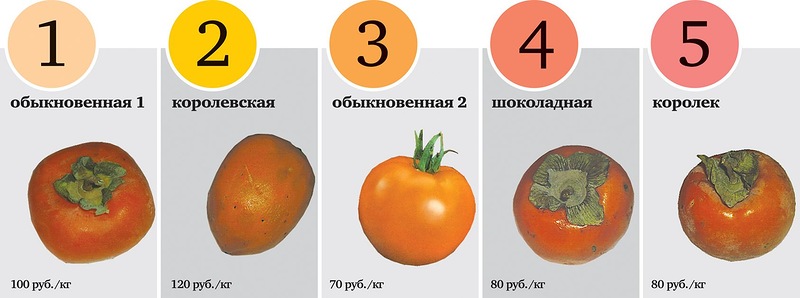
For example, this fruit contains an organic substance called catechin. It is a potent antioxidant that has enhanced anti-inflammatory, antibacterial and anti-hemorrhagic effects. Naturally, all these properties are promoted by the rich composition of minerals and vitamins.
The organic acids found in these fruits (for example, betulinic acid and beta-carotene) well strengthen the immune system, prevent aging and reliably protect the body from the occurrence of cancers.
Persimmon against constipation
This fruit has a mild laxative effect, which is achieved through its high content of natural fiber and water. Regular use will help to cope with the problem of obstruction or it will be an excellent preventive measure against constipation.
Fighting infections and respiratory diseases
A sufficiently high concentration of C vitamins in persimmons helps the human body to significantly strengthen its immunity. With the flu and colds the use of persimmons will facilitate their course and help to quickly defeat the disease. It goes well with the same helpers of the immune system as honey and raspberry jam.
Antihistamine effect
Persimmon fruits have a beneficial effect on skin areas that have been susceptible to allergic reactions. To make a compress, you need to cook persimmon according to a specific recipe. Peel 500 g of this fruit and mash well with a fork until mushy. Next, you need to pour 2 liters of water into this puree, mix thoroughly, and then leave to infuse in the sun for a week.
After that, you need to drain the liquid and leave it in the sun for another three days, and discard the remaining pulp. After that, you can safely use the resulting product and observe the miraculous effect of persimmon. Just apply compresses with this tincture on the damaged areas of the skin 4 times a day and leave them for 5 - 10 minutes.
Persimmon for hemorrhoids
When this disease occurs, it can be treated with dried persimmon. The benefits and harms of such treatment have not been scientifically proven, but in folk medicine this remedy is used very often. Moreover, the healing effect is observed both at an early stage and in chronic diseases.
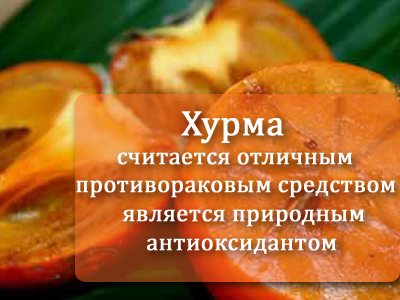
To prepare this remedy for hemorrhoids, you must soak dried persimmon in water, and then leave for about half an hour. It is recommended to take this drink 3-4 times a day, two tablespoons until complete recovery. Usually the effect is achieved after the first week of use.
Also, with hemorrhoids, raw rice porridge with persimmon is excellent. To prepare it, you need to mix 2 cups of boiled water, 15 - 20 grams of persimmons and 50 grams of rice. This mixture needs to stand for about 6 - 8 hours until the rice grains are completely softened. After that, the porridge can be consumed 2 times a day.
Getting rid of hiccups
For persistent or frequent hiccups, you can use the following recipe. Mix 5 stalks of persimmons with 5 grams of dry cloves, and also add a little fresh peeled ginger root. You can take this mixture 2 - 3 times a day, but only warm.
Persimmon for health while increasing digestibility
This fruit contains a fairly large amount of copper, which helps the human body to absorb more iron from incoming food. Iron, in turn, helps the normal formation of immunity.
Persimmons also significantly reduce the production of sweat, which reduces the loss of nutrients by the body. This property of this fruit makes it almost indispensable for people who go in for sports.
The cosmetic effect of persimmon
In the manufacture of various cosmetics, astringent artificial components are used, which do an excellent job of cleaning and narrowing the pores of the skin. Persimmon fruits also have a similar property and are very often included in facial cleansing masks.
You can make a persimmon mask at home and achieve great results. To do this, mix one egg yolk with the peeled pulp of this fruit and add a couple of drops of lemon juice. The result from such a mask will be noticeable almost immediately: the face contour will be tightened, fine wrinkles will be smoothed out, and the skin will acquire healthy elasticity.
Fruit for hemophilia
For cooking effective means this disease will require 30 grams of dried fruits of this fruit and the same amount of lotus root. After thoroughly grinding these two ingredients, you need to pour them with two glasses of boiled water and leave for 15 minutes. Then add a tablespoon of honey and mix thoroughly.
You can take the resulting mixture 2 times a day for 2 weeks. After that, it is worth refraining from use for a week, and then taking it according to the same scheme until complete recovery.
Persimmon for weight loss
All fruits and vegetables tend to contribute to a person's weight loss. Persimmon is no exception to the rule, so the benefits and harms of losing weight from this fruit should be considered in more detail. Given the low calorie content of persimmons, it is considered an excellent choice when drawing up a diet. In addition, it contains a lot of fiber, which significantly improves the functioning of the digestive system. Persimmon helps in the absorption of nutrients.
Natural antidepressant
This sweet fruit contains an abundance of K (potassium) and simple sugars that turn persimmons into a natural cure for all kinds of stress. Eating one fruit per day will be the ideal amount to completely relax, calm down, relieve fatigue and tension.
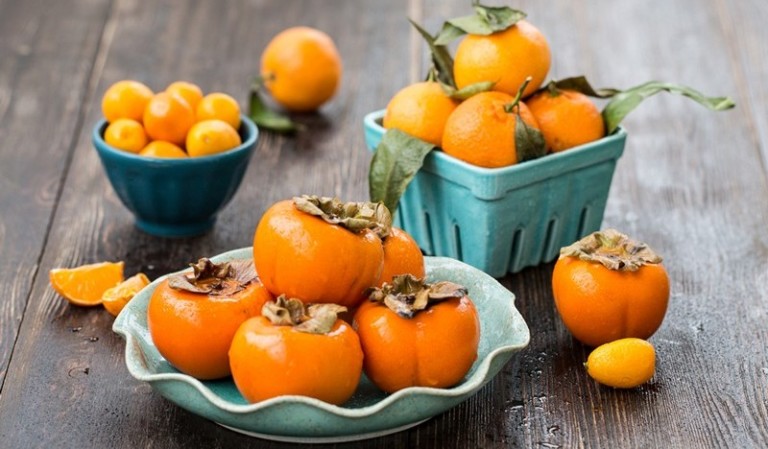
It is difficult to underestimate the regenerative functions of the antioxidants found in persimmon fruit. Their main function is to help the human liver in the restoration of its damaged cells. Also, studies have proven the effectiveness of these antioxidants in neutralizing toxins in the body, which significantly helps the liver. Thus, there are more benefits than harm from persimmons. The study did not reveal any contraindications for the liver.
Persimmon bones benefit and harm
Persimmon is rich not only in its fruits. You can also use its bones, which are found in some varieties. Usually there are about five of them in one fruit.
Persimmon seeds are used to make flour and bake bread products. You can also eat them roasted like regular seeds. There is no particular benefit or harm from this product.
Diuretic properties
Ca (calcium) and K (potassium) in fully ripe persimmons are excellent diuretic properties. The effect of taking persimmon in this case is much stronger and safer than that of synthetic drugs that can be purchased at pharmacies. The only drawback is that potassium is not excreted independently from the body, but a similar effect is found in almost all known diuretics.
Persimmon for pregnant women benefits and harms
What are the consequences of consuming persimmon during pregnancy? The benefits and harms of this fruit have been carefully studied in numerous studies. The results of these studies are interpreted differently by different specialists.
Many doctors unanimously insist that the use of persimmon is extremely necessary for women who are expecting the birth of a child. It is quite difficult to deny the enormous benefits of eating this fruit, because persimmon is simply an invaluable source of essential vitamins and minerals. These substances are extremely useful for the full development of the fetus in the womb. It manifests itself perfectly healing effect from persimmon with hypertension, which quite often occurs in women during childbearing.
The simultaneous benefits and harms of persimmon for women in position is observed with a large use of this fruit. In this case, the entire digestive process is disrupted and the occurrence of stomach stones is not excluded.
In any case, you should definitely consult a specialist about the use of persimmons.
Persimmon contraindications
Despite all the benefits, these fruits have certain contraindications. For example, it is strongly discouraged to eat the peel. Unlike the vitamin-rich skins of apples and pears, it contains a huge amount of tannin, which adversely affects the functioning of the stomach. Therefore, it is necessary to peel the persimmon before eating. The benefits and harms of diabetes can be completely unpredictable. Due to the high sugar content in the composition, this fruit can cause hypoglycemia, so it is better to limit the amount of this product or completely exclude it from the diet.
Also, persimmon absolutely should not be combined with saturated protein products (crabs, shrimps, marine fish). The tannins in this fruit act on proteins and cause them to clump together in the stomach. The resulting lumps that stick together cannot move further and turn into stones. After some time, these stones increase, begin to interfere with the full digestion of food, cause bloody vomiting and sharp pain in the stomach. In this case, it will be possible to correct the situation only with the help of surgical intervention.
Another unpleasant consequence of the excessive use of persimmons can be the destruction of the tooth enamel of the teeth and the occurrence of caries. The reason for this lies in the high content of fiber in the pulp, which constantly remains between the teeth. In turn, the teeth are exposed to tannins that destroy the enamel. Therefore, it is recommended to thoroughly rinse your mouth or brush your teeth after eating the fruit.
It is not necessary to take this fruit on an empty stomach, as tannin alone forms stones (similar to the effect on foods high in protein). Also, experts do not recommend using persimmon for people who have recently undergone surgery. A weakened intestine may not be able to cope with this load, which will lead to obstruction. The astringent components of the fruit can slow down the metabolism, so people who are overweight need to carefully consume persimmons.
Persimmon kinglet benefit and harm
The most common type of persimmon in the vast the former USSR... It belongs to the astringent varieties and therefore needs to be fully ripened. When fully ripe, the fruit has a distinct taste and sweetness, and its shape resembles a slightly squeezed tomato. Skin color is bright orange.
The benefits and harm to health from persimmon varieties of Korolek are the same as from any other variety: in a ripe state, the fruit is of great benefit to those people who have no contraindications to taking this product. Otherwise, you should abandon its use or look for a non-binding variety.
Persimmon Sharon benefits and harms
This variety is in great demand in the market and is classified as non-knitting. True, the cost of this variety of persimmon is an order of magnitude higher than that of a knitting beetle. Fruits are predominantly pitted and slightly pale in color. Another noteworthy feature of this variety is the rather high density fruits. Therefore, they are often used in cooking to prepare various salads or desserts.
Results and conclusions
After a detailed study of the topic "persimmon benefit and harm", it becomes clear that the unique properties of the fruits of this fruit helps the body in the fight against various diseases, and can, on the contrary, lead to their formation. Therefore, you need to be careful about the use of persimmon, because the benefits and harms to the body from it can depend on various factors.
Sweet and juicy appetite!
In winter, when most fruits and vegetables are about to bear fruit, it is the persimmon season. In the homeland of the orange berry, it is called the food of the gods. Currently, this unusual, juicy fruit is very popular in many countries around the world.
Why is persimmon useful?
There are about five hundred different varieties of this berry, each of which has an excellent taste and a range of nutrients. Most of persimmon grows in tropical conditions, so only 3 types of fruit can be purchased in Russia - Japanese, Caucasian and chocolate (the latter is also called a king). The beneficial properties of persimmon are due to its composition: there are all kinds of antioxidants, complex carbohydrates, proteins, organic acids.
The sweet berry contains more fiber than apples, which indicates its ability to improve digestion. Vitamins in persimmon are represented by groups A, C, P. In addition, the valuable minerals contained in it provide benefits to the fruit - calcium, magnesium, potassium, phosphorus, etc. Due to this composition, the product is ranked among the most useful berries. So, nutritionists recommend eating orange berries for those people who have problems with the kidneys, liver, digestive tract, heart, blood vessels.
The benefits of persimmon for a woman's body
Sunny peach, as the people of Japan call the fruit, has undeniable benefits for the human body and can only compete with citrus fruits in its nutritional value. Regular consumption of orange berries is indicated for people with various diseases. The benefits of persimmon for women are based on the content of the following substances:
- Potassium. This is an indispensable trace element for women who have reached menopause, since at the same time, the risk of stroke is greatly increased in the fair sex, and the berry helps to avoid this. In addition, potassium reduces the likelihood of developing many other pathologies by 15% and eliminates edema by removing excess fluid from the body, thereby improving appearance women.
- Magnesium. The benefits of this element for women are obvious - magnesium normalizes the menstrual cycle, increases the chances of conceiving a child, and also has a positive effect on the course of pregnancy and childbirth. Due to the content of phytoestrogens in the fruit, persimmon is able to normalize the female hormonal background.
- Sodium. This substance is actively involved in metabolic processes, provides an acid-base balance. Persimmon will be especially useful for those women who go in for sports, since the sodium contained in it makes the joints more elastic, and the muscles tone them. In addition, the juicy, tasty berry, when consumed regularly, will help you lose weight. However, harm from the fetus is also possible, since increased consumption of it leads to an increase in blood pressure.
- Iron. A frequent problem of women of childbearing age is the deficiency of this element, so it is highly desirable for them to eat persimmons.
- Calcium. This substance normalizes the state of the nervous system, has a beneficial effect on the work of the heart.

Why is persimmon useful for men
Prostate disease is widespread among mature men. This ailment interferes with the full life of the stronger sex. The causes of pathology can be infections of the respiratory tract, genitals and intestines, stress, etc. The harm of such factors is deterioration of blood circulation, hormonal imbalance and much more. The main methods of treating prostatitis include proper nutrition... The diet in this case is prescribed by a doctor and involves the use of fresh fruits, including persimmons. The benefits of persimmon for men are explained by the content of the berry of such substances:
- beta-carotene (vitamin A) participates in the synthesis of hormones, the formation of sperm, reduces the likelihood of the development of pathologies on the mucous membrane of the genital organs;
- B vitamins are beneficial for men in that they activate metabolic processes at the cellular level, reduce the level of prolactin, a hormone that promotes the formation of prostate adenoma;
- ascorbic acid protects against impotence, improves the quality of semen.
Persimmon during pregnancy
The benefits of sun plum for humans are undeniable, and the nutritional value is off scale, even exceeding the indicators of such fruits and berries as figs, apples, grapes. Persimmon for pregnant women is important with such beneficial properties:
- strengthens the woman's immunity, weakened at this time;
- promotes fetal growth;
- improves metabolism in the female body;
- makes up for the lack of valuable substances for pregnant women - iodine, potassium;
- relieves puffiness, which are often in expectant mothers;
- has a sedative effect;
- prevents the development of constipation.

Persimmon while breastfeeding
Harm to the fetus during lactation has not been proven, however, there are some restrictions on the use of berries during breastfeeding... Doctors do not advise women to include persimmons in their diet for the first 3 months after the birth of a child, since it is highly likely that he will develop an allergy. The orange fruit can harm the baby, as his stomach and intestines are still not working well.
First, it is better to eat one small piece of fruit and observe the baby's reaction during the day. If persimmon during breastfeeding did not cause negative reactions, you can gradually increase its share in the diet of a young mother. During lactation, there will be no harm to the child and the woman if you consume no more than 200-300 grams of the product per day. The benefits of the berry during this period are:
- increasing the protective functions of the immunity of women and children;
- prevention of postpartum anemia;
- normalization of the functioning of the heart, blood vessels;
- replenishing the amount of calcium in a woman's body depleted after pregnancy, normalizing the growth of the baby's bone tissue;
- establishing the work of the digestive tract;
- prevention of kidney stones.
Persimmon with pancreatitis
The benefits and medicinal properties of persimmon are based on reducing the likelihood of exacerbation of chronic diseases of the digestive organs, including the pancreas. The berry improves intestinal motility, improves the functioning of the stomach, and participates in the regulation of energy metabolism. The enzymes of the product promote the processing of proteins, carbohydrates and fats, and thanks to the hormones that make up the fetus, normal blood glucose levels are maintained.
Persimmon for pancreatitis is prescribed as part of a therapeutic diet. The beneficial properties of the berry in this case support the normal functioning of the pancreas, relieve inflammation from it, thereby eliminating / reducing pain. The harm from persimmon with pancreatitis is possible only if you use it directly in an acute pathological state of the organ. In other cases sweet fruit is extremely beneficial for people with this condition. The harmful properties of persimmon lie in its such features:
- During pancreatitis, the production of the hormone by the pancreas decreases, as a result of which sugar is poorly absorbed by the body. Persimmons contain easily digestible carbohydrates, thanks to which the glucose balance is restored. However, if you overuse the fruit, you will harm yourself.
- Tannin - the substance in the orange berry - has a strengthening, astringent effect. An excess of an element in the body leads to constipation. To avoid such harm, you should eat exclusively overripe, soft fruits and in reasonable quantities (no more than 1 piece per day).
- Persimmons can cause harm to a person with pancreatitis due to the content of fructose and glucose in it. During the period of exacerbation, it is better to stop the consumption of the fetus so as not to overload the pancreas with sugar.
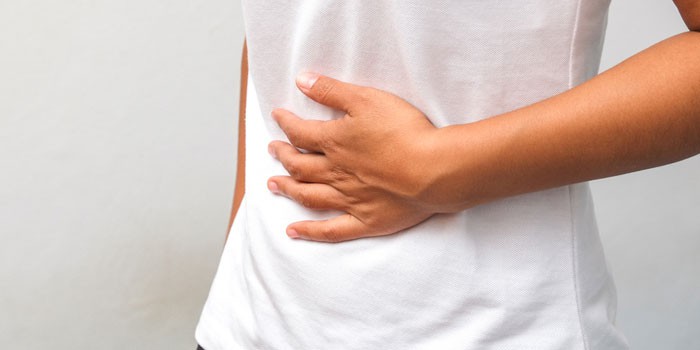
Persimmon for diabetes
There is a category of people to whom the berry can cause serious harm - diabetics. These people suffer from a very serious endocrine disease, are forced to adhere to a strict diet for their entire lives and monitor the glycemic index of the foods they eat. With diabetes, the level of glucose in the blood is always elevated, and since the sweet fruit contains a large amount of sugar, eating it with such a diagnosis is not only harmful, but also deadly. Persimmon for diabetics is absolutely contraindicated.
Persimmon - benefits and harm to the liver
Juicy orange berry - a treasure a large number vitamins, due to which, when using the product, the immune system is strengthened, the protective properties of the body increase against different types pathologies, including liver disease. What other benefits does persimmon bring to the liver:
- The rich composition of the fruit has a positive effect on the liver, protecting it from diseases associated with the deposition of fat on the organ. Since persimmon contains coarse fibers, it helps to improve lipid metabolism. The use of persimmon, in addition, lies in the prevention of the appearance of hepatosis of the bile ducts and liver - a disease that entails the degeneration of the liver tissue, its scarring. The harm of such pathogenic processes leads to cirrhosis of the liver - incurable disease.
- Persimmons are also beneficial due to the content of fructose / glucose, which restore sugar levels. Since a decrease in glucose leads to the breakdown of liver glycogen, it is only necessary to eat only 1-2 fruits per day to normalize the level of glycogen - the main source of energy.
- Since the liver is the only filter in the human body, it wears out quickly. Harm to the body is caused by stress, uncontrolled medication treatment, unbalanced nutrition, bad habits... Potassium and magnesium, which persimmons contain, regulate water balance, removing excess fluid from the body. Toxins, toxins and other decay products that harm the liver are removed with urine.
In addition to the benefits for the liver, persimmons can also be harmful. The fruit is forbidden to eat not only for diabetics or people with exacerbation of chronic pancreatitis. Thanks to its medicinal properties Persimmons are classified as therapeutic products, and they can sometimes have side effects. Those who have any liver problems should consult a doctor before consuming persimmons on a daily basis.
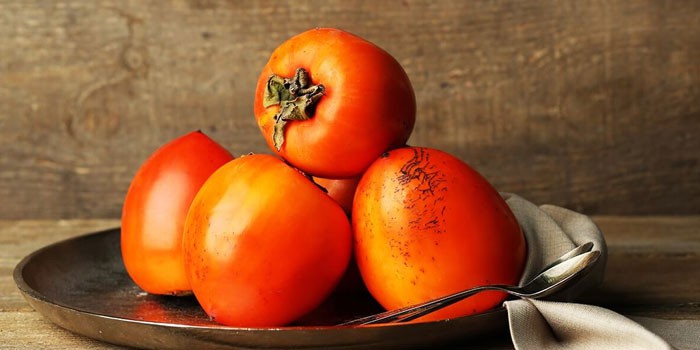
Persimmon - contraindications
The fruit is excellent not only for the prevention of the development of various diseases, but also for weight loss, since it has a low calorie content. So, per 100 grams of the product, there are only about 55-60 calories (the amount depends on the variety, ripeness of the berry). Nevertheless, in addition to the undeniable benefits, there are also contraindications for persimmon. The fruit is not recommended to be eaten before bedtime or on an empty stomach, as it contains pectin and tannic acid, which contribute to the formation of stomach stones.
Persimmon - contraindications:
- obesity (the maximum harm is brought about by dried or dried fruit);
- postoperative period (if the operation was on the digestive tract);
- it is forbidden to eat fruit for children under one year old (this often causes constipation);
- diabetes;
- the berry will bring harm to people with hard stools, since it has fastening properties;
- you can not drink the fruit cold water or milk;
- during lactation, until the baby reaches three months of age, it is advisable for a woman to refrain from using the product.
Video: persimmon - benefits and harms to the body
With coming late autumn many fruits and vegetables disappear from the counters. In their place comes an oriental berry - persimmon. Yes, this is not a fruit, but a berry that is the fruit of exotic ebony trees. These trees originally grew only in the south of China. Then this plant spread throughout the world, having passed selective selection.
Now persimmon grows and is cultivated in many countries with warm climates. Fruit trees grow in countries: Spain, Italy, Abkhazia, Iran, Turkey, Greece, Mexico, Tajikistan, Australia. Is not complete list countries cultivating and exporting fruits around the world. All this is due to the fact that the benefits of persimmon for people are high, and the harm is minimal.
 IN different countries different varieties of this wonderful berry are grown, but the most common types of steel are: Japanese, Korolek, Sharon, chocolate, Mobolo, Paraguayan, Kaki. These varieties are frequent guests of our counters. But there are in different countries their own endemic varieties of persimmons. So on the Philippine Islands grows a bright red persimmon, called the velvet apple. And the South American berry variety, which looks like a huge black apple, weighing about 900 grams, is called a black apple.
IN different countries different varieties of this wonderful berry are grown, but the most common types of steel are: Japanese, Korolek, Sharon, chocolate, Mobolo, Paraguayan, Kaki. These varieties are frequent guests of our counters. But there are in different countries their own endemic varieties of persimmons. So on the Philippine Islands grows a bright red persimmon, called the velvet apple. And the South American berry variety, which looks like a huge black apple, weighing about 900 grams, is called a black apple.
In Japan, the orange-red Chinese variety with fruits up to 8 centimeters in diameter is popular. But in Ceylon, persimmon grows, which is not useful for the human body, for which black wood is highly valued. A variety of persimmon grows in Africa - medlar. These are small berries used for food and for making wine.
 The benefits of persimmon are high, as it is one of the few local foodstuffs, and black wood, known worldwide as the "ebony of Zanzibar", is very durable. Even termites are unable to damage it.
The benefits of persimmon are high, as it is one of the few local foodstuffs, and black wood, known worldwide as the "ebony of Zanzibar", is very durable. Even termites are unable to damage it.
There is a persimmon variety that has special kind... It is a Black Sapote with green skin and brown, jelly-like flesh. This variety came from Guatemala, became widespread in Spain, Brazil, Hawaii. The aforementioned common variety Kaki is good in that it has no seeds and is practically invisible to the taste of viscosity even in unripe fruits.
Now in the world there are about 750 varieties of persimmon, of which 200 species are agricultural varieties that are useful for the human body. That is why the berry is popularly called the “fruit of the Gods”, the “choice of gourmets”, then the “Chinese peach”, then the “food of the Gods”.
Persimmon composition
CLEAR TWO SIZES IN A MONTH!
The weight loss formula is simple - to burn more calories than it enters the body. But how can this be achieved in practice? Exhausting yourself with complex and often dangerous diets is very risky. Spending a lot of money and time on the gym is not for everyone according to their capabilities. Mistake of all FALLING THINKERS called Kartunkova: "Girls, just lose weight, here's the recipe: before breakfast ..."
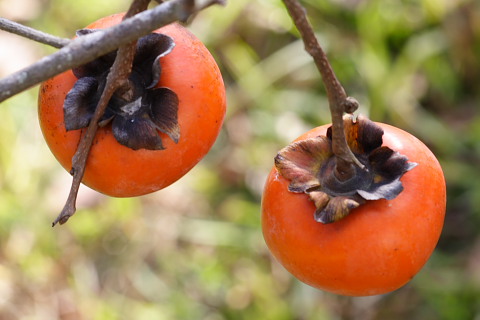 The chemical composition is quite varied. Depending on the variety and degree of ripeness, the calorie content of the fruit can be 50 kcal or 100 kcal. However, any variety is rich in vitamins C, B, P, K, E, A, minerals, polysaccharides, fiber, lutein, carotene. But persimmon does not contain fats and cholesterol. Due to their composition, the berries have won recognition and respect for themselves, taking one of the leading places in the fruit diet of people in the autumn-winter period. Persimmon has become not only a favorite delicacy, but a complete food product.
The chemical composition is quite varied. Depending on the variety and degree of ripeness, the calorie content of the fruit can be 50 kcal or 100 kcal. However, any variety is rich in vitamins C, B, P, K, E, A, minerals, polysaccharides, fiber, lutein, carotene. But persimmon does not contain fats and cholesterol. Due to their composition, the berries have won recognition and respect for themselves, taking one of the leading places in the fruit diet of people in the autumn-winter period. Persimmon has become not only a favorite delicacy, but a complete food product.
The benefits of persimmon are invaluable
After all, this is a true storehouse of useful substances, thanks to its chemical composition. If we consider in detail, then we can distinguish the following qualities useful for the human body:
- For the digestive system, the benefit of the berry lies in the high content of pectin, which perfectly removes toxins, copes with gastrointestinal upset, disinfects the gastrointestinal tract from staphylococcus and Escherichia coli, relieves stomach inflammation, quickly satisfies hunger, and reduces flatulence.
- For the cardiovascular system, persimmon benefits in the form of nutrition of the heart muscle with a high content of monosaccharides. Regulates blood pressure. Effective in the fight against atherosclerosis. Improves the condition of patients with varicose veins. Relieves pain in the heart. An excellent means of preventing myocardial infarction, heart ischemia.
- In the fight against oncology and increasing immunity, persimmon is indispensable. It has antioxidant properties, helps to delay the development of tumors, tones the body, increases the overall performance of the body. Restores damaged cells, bringing only benefit.
- Improves the quality of vision, maintains the performance of the eye muscles. Nourishes the retina, protects against cataracts.
- In combination with milk, it has a beneficial effect on the functionality of the kidneys. It has a diuretic effect. An excellent prophylactic agent in the fight against urolithiasis.
- The high content of iodine in fruits and iron will help normalize the thyroid gland, eliminating many health problems.
- Possession of bactericidal properties positively affects the whole body, protecting it from colds, pneumonia, ARVI and ARI. Accelerates recovery from angina. Easily copes with wounds and burns if a piece of ripe fruit is applied to the damaged area of the body. Persimmon juice is an excellent throat gargle.
- An excellent dietary remedy. 3-4 pieces replace 1 meal, while satisfying hunger a small amount calories.
- It brings great benefits and occupies a special place in the diet of pregnant women, protecting against anemia and toxicosis, vitamin deficiency. Compensates for the lack of many elements.
- As a cosmetic product, it improves the quality of the skin, relieves inflammation, strengthens the oval of the face, smoothes wrinkles, and tightens the skin. Persimmon is an excellent natural remedy for applying masks at home.
- It has a beneficial effect on the human nervous system. Acts as a mild sedative. Improves sleep. Relieves depressive conditions.
It is possible to list the useful properties of persimmon for a long time. This is strengthening the gums, and cleaning the liver, and strengthening the immune system. Almost solid benefit, but ...
Right choice
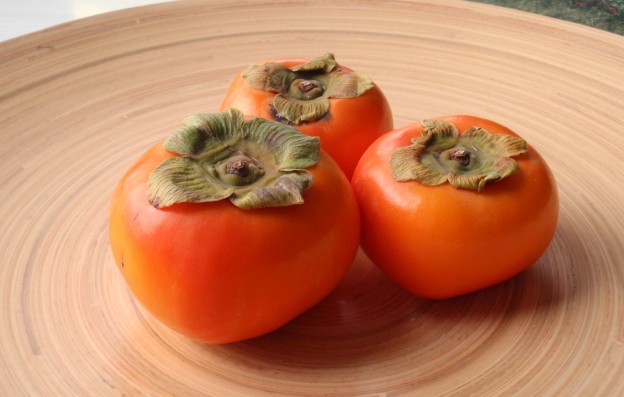 Of course, in order for the benefits of the use and use of persimmon for the body to be complete, the fruits should be chosen correctly. After all, overripe or unripe persimmons will not give the desired effect, will not be beneficial, will disappoint in taste, and may be harmful.
Of course, in order for the benefits of the use and use of persimmon for the body to be complete, the fruits should be chosen correctly. After all, overripe or unripe persimmons will not give the desired effect, will not be beneficial, will disappoint in taste, and may be harmful.
- Fruits should not have dark spots, outgrowths, dents.
- The skin should be smooth, shiny, usually glossy.
- The color of the fruit must match the variety.
- The consistency of the pulp at full maturity should resemble dense jelly.
- The berry should be soft, while having a firm skin.
- A stalk and leaves at the base of the fruit must be present.
- Cultivated varieties should have a minimum of viscosity in taste.
Of course, you can correct the situation if the acquired persimmon turned out to be unripe or very viscous to taste. To do this, the fruits are frozen for 6-10 hours in a freezer or immersed in hot water temperature of 40-50 degrees for the same time. Another amazing and unique way of ripening: the fruits are placed in a food bag together with ripe apples or bananas for a day. Due to the gaseous substance of accelerated ripening released from apples or bananas, the persimmon will ripen.
Contraindications
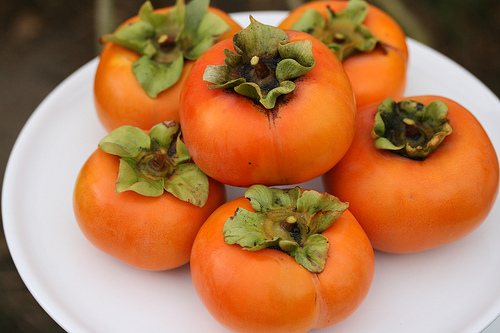 Despite the large number of useful properties of persimmon, there are some restrictions on its use. The harm of these fruits lies in several positions. It is most pronounced when it is abused or misused.
Despite the large number of useful properties of persimmon, there are some restrictions on its use. The harm of these fruits lies in several positions. It is most pronounced when it is abused or misused.
- You can not eat fruits on an empty stomach. This can cause bloating, spontaneous diarrhea, and heaviness in the stomach.
- Excessive use of persimmons can lead to harm in the form of constipation, intestinal obstruction and the formation of bezoars. This is especially true for the use of astringent varieties.
- When people with food allergies eat large amounts of persimmons, allergic reactions are possible.
- Eating persimmons by children under 3 years old can cause negative results and harm, since it is difficult for a child's stomach to cope with the tannin contained in fruits.
- The greatest harm can be caused by the unrestricted use of persimmon fruits by people with diabetes mellitus, especially type 2. This is due to the high content of monosaccharides, glucose and sucrose in the chemical composition of the fruit. People suffering from obesity and diabetes mellitus, it is better to limit themselves in the use of this fruit. If there is a desire to eat persimmons, then to avoid harming the body, unripe fruits should be used.
- When feeding newborn babies breast milk you should completely limit yourself to the use of persimmons. Otherwise, you can harm the baby's health.
- At serious illnesses Gastrointestinal tract, including gastritis, should refrain from persimmon.
- There is a possibility of harm to health by using persimmons in your diet if you are diagnosed with pancreatitis or there is a disease of the pancreas.
- There is a separate category of people who simply cannot stand persimmon.
- There is evidence that persimmons can be harmful to dental health, as tannic acids lead to tooth decay. That is why you need to brush your teeth after each berry intake.
- It is better for persons after surgery not to eat these berries in the near future. The harm from persimmon during this period is metabolic disorders, intestinal problems.
If you adhere to objective data about persimmons and eat these fruits in accordance with your physiological capabilities, then you can avoid harming the body by gaining only benefits.